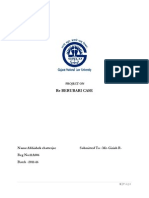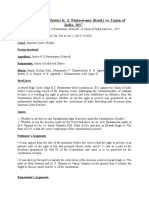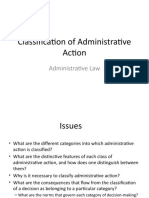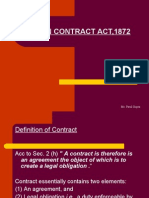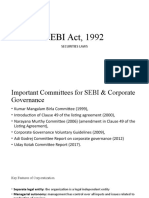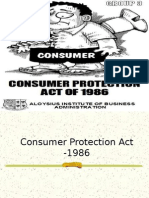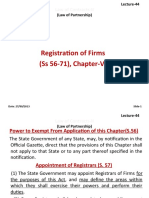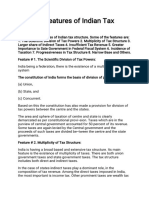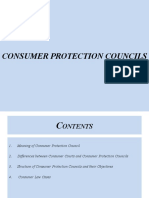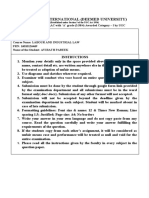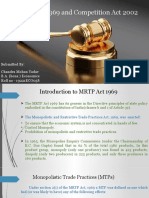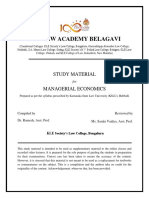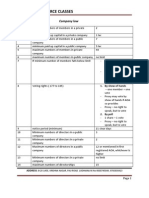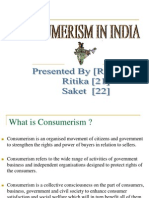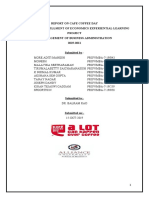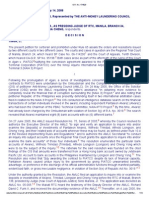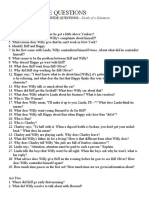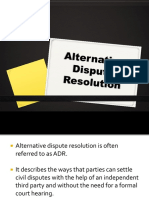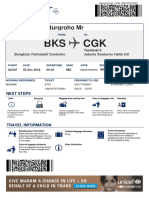100%(3)100% found this document useful (3 votes)
328 viewsConsumer Protection Act 2019
Consumer Protection Act 2019
Uploaded by
Spoorthi N SwamyThe Consumer Protection Act, 2019 aims to [1] provide timely and effective administration and settlement of consumer disputes and [2] enhance the protection of consumer rights. It replaces the Consumer Protection Act, 1986 to address new challenges in the digital era. Key aspects include establishing a 3-tier system of Consumer Protection Councils at the district, state, and central levels for consumer education and a 3-tier system of Consumer Disputes Redressal Commissions at the district, state, and national levels to settle disputes. The Act also outlines the key rights of consumers.
Copyright:
© All Rights Reserved
Available Formats
Download as PPT, PDF, TXT or read online from Scribd
Consumer Protection Act 2019
Consumer Protection Act 2019
Uploaded by
Spoorthi N Swamy100%(3)100% found this document useful (3 votes)
328 views35 pagesThe Consumer Protection Act, 2019 aims to [1] provide timely and effective administration and settlement of consumer disputes and [2] enhance the protection of consumer rights. It replaces the Consumer Protection Act, 1986 to address new challenges in the digital era. Key aspects include establishing a 3-tier system of Consumer Protection Councils at the district, state, and central levels for consumer education and a 3-tier system of Consumer Disputes Redressal Commissions at the district, state, and national levels to settle disputes. The Act also outlines the key rights of consumers.
Copyright
© © All Rights Reserved
Available Formats
PPT, PDF, TXT or read online from Scribd
Share this document
Did you find this document useful?
Is this content inappropriate?
The Consumer Protection Act, 2019 aims to [1] provide timely and effective administration and settlement of consumer disputes and [2] enhance the protection of consumer rights. It replaces the Consumer Protection Act, 1986 to address new challenges in the digital era. Key aspects include establishing a 3-tier system of Consumer Protection Councils at the district, state, and central levels for consumer education and a 3-tier system of Consumer Disputes Redressal Commissions at the district, state, and national levels to settle disputes. The Act also outlines the key rights of consumers.
Copyright:
© All Rights Reserved
Available Formats
Download as PPT, PDF, TXT or read online from Scribd
Download as ppt, pdf, or txt
100%(3)100% found this document useful (3 votes)
328 views35 pagesConsumer Protection Act 2019
Consumer Protection Act 2019
Uploaded by
Spoorthi N SwamyThe Consumer Protection Act, 2019 aims to [1] provide timely and effective administration and settlement of consumer disputes and [2] enhance the protection of consumer rights. It replaces the Consumer Protection Act, 1986 to address new challenges in the digital era. Key aspects include establishing a 3-tier system of Consumer Protection Councils at the district, state, and central levels for consumer education and a 3-tier system of Consumer Disputes Redressal Commissions at the district, state, and national levels to settle disputes. The Act also outlines the key rights of consumers.
Copyright:
© All Rights Reserved
Available Formats
Download as PPT, PDF, TXT or read online from Scribd
Download as ppt, pdf, or txt
You are on page 1of 35
The Consumer Protection Act, 2019
Prof. P.A. Mohandas
M.A, LL.B, MBA, LL.M [IPR], D.Tech
.
The Consumer Protection Act, 2019
An Overview:- On 15 March, 1962, Mr. John F Kennedy, the former
President of USA spoke for the first time in the US senate about
the Consumer rights. He proposed 04 consumer rights “right to
safety, right to information, right to choose and right to be heard.
15 March is celebrated every year as world consumer right day.
Later, India has recognized 06 consumer rights and included it in
Indian consumer right Act, 1986.
The New Act (Consumer Protection Act 2019), seeks to replace the more than
THREE decades old Consumer Protection Act, 1986, and it brings
about fundamental changes to the existing 1986 legislation.
The Globalization and Digitalization has ushered in a new era of commerce
and digital branding, as well as a new set of customer expectations.
Digitization has provided easy access to a large variety of choice,
convenient payment mechanisms, improved services and shopping as per
convenience. However, along the growth path it also brought in
challenges related to consumer protection.
Scope :
To address the new set of challenges faced by consumers in the
digital age, the Indian Parliament, on 09 August 2019, passed the
landmark Consumer Protection Bill, 2019.
AIM:-
To provide timely and effective administration and settlement of
consumer disputes and to enhance the protection of Consumer
Rights.
Object of Act 2019
1.To provide protection to the rights and interests of
Consumers/Customers.
2.To establish authorities for timely and effective administration
of settlement of consumer disputes.
RIGHTS OF CONSUMERS UNDER
CONSUMER PROTECTION ACT 2019
(a). Right to Safety (Article 21 of
constitution). Donoghue Vs. Stevenson
(1932) AC 562
(b). Right to Information,
(C). Right to Choose;
(d). Right to be Heard;
(e). Right to seek Redressal;
(f). Right to Consumer Education
(Consumer Councils).
Consumer Protection Councils
III Tier System
1. The central consumer protection council.
2. The state consumer protection council
3. District Consumer Protection Council
Objects of Consumer Protection Councils:-
The objects of the Central Council shall be to
render advice on promotion and protection of
the consumers' rights under this Act.
1. The District Consumer Protection Council
The objects of every District Council shall be to render advice on
promotion and protection of consumer rights under this Act within
the district.
The District Council shall be an advisory council and consist of
the following members, namely:—
1. The Collector of the district (by whatever name called), who shall
be the Chairperson; and
2. Such number of other official and non-official members
representing such interests as may be prescribed.
3. The District Council shall meet as and when necessary but not less
than two meetings shall be held every year.
4. The District Council shall meet at such time and place within the
district as the Chairperson may think fit and shall observe such
procedure in regard to the transaction of its business as may be
prescribed.
2. The State Consumer Protection Council:-
The objects of every State Council shall be to render advice on promotion
and protection of consumer rights under this Act within the State.
The State Council shall be an advisory council and consist of the following
members, namely:—
(a). The Minister-in-charge of Consumer Affairs in the State
Government who shall be the Chairperson;
(b) Such number of other official or non-official members
representing such interests as may be prescribed;
(c) Such number of other official or non-official members, not
exceeding ten, as may be nominated by the Central Government.
The State Council shall meet as and when necessary but not less than two
meetings shall be held every year.
The State Council shall meet at such time and place as the Chairperson
may think fit and shall observe such procedure in regard to the transaction
of its business, as may be prescribed.
3.The Central Consumer Protection Council:-
The objects of the Central Council shall be to render advice on
promotion and protection of the consumers 'rights under this Act.
The Central Council shall be an advisory council and consist of the
following members, namely:—
(a). The Minister-in-charge of the Department of Consumer
Affairs in the Central Government, who shall be the Chairperson;
and
(b). Such number of other official or non-official members
representing such interests as may be prescribed.
The Central Council shall meet as and when necessary, but at least
one meeting of the Council shall be held every year
The Central Council shall meet at such time and place as the
Chairperson may think fit and shall observe such procedure in
regard to the transaction of its business as may be prescribed.
*******CONSUMER DISPUTES REDRESSAL
COMMISSION
1. The District Consumer Disputes Redressal
Commission.
2. The State Consumer Disputes Redressal
Commission.
3. The National Consumer Disputes Redressal
commission for entire India
1.District Consumer Disputes Redressal Commission
Jurisdiction of District Commission:-
the District Commission shall have jurisdiction to entertain complaints where the
value of the goods or services paid as consideration does not exceed one crore
rupees.
(2) A complaint shall be instituted in a District Commission within the local limits
of whose jurisdiction,—
(a)the opposite party or each of the opposite parties, where there are more than one,
at the time of the institution of the complaint, ordinarily resides or carries on
business or has a branch office or personally works for gain; or
(b)any of the opposite parties, where there are more than one, at the time of the
institution of the complaint, actually and voluntarily resides, or carries on business
or has a branch office, or personally works for gain, provided that in such case the
permission of the District Commission is given; or
(c)the cause of action, wholly or in part, arises; or
(d)the complainant resides or personally works for gain . The District Commission
shall ordinarily function in the district headquarters and may perform its functions at
such other place in the district, as the State Government may, in consultation with
the State Commission, notify in the Official Gazette from time to time.
Manner in which complaint shall be made.
A complaint, in relation to any goods sold or delivered or
agreed to be sold or delivered or any service provided or
agreed to be provided, may be filed with a District
Commission by—
(a) the consumer,—
(b) Any recognized consumer association
(c) One or more consumers, where there are numerous
consumers having the same interest, with the permission of
the District Commission
(d) The Central Government, the Central Authority or the
State Government, as the case may be: Provided that the
complaint under this sub-section may be filed electronically
in such manner as may be prescribed.
Reference to mediation:- At the first hearing of the complaint
after its admission, or at any later stage, if it appears to the District
Commission that there exists elements of a settlement which may be
acceptable to the parties, except in such cases as may be prescribed, it may
direct the parties to give in writing, within five days, consent to have their
dispute settled by mediation in accordance with the provisions of Chapter V.
Every proceeding before the District Commission shall be deemed to be
a judicial proceeding within the meaning of sections 193 and 228 of the
Indian Penal Code, and the District Commission shall be deemed to be a
criminal court for the purposes of section 195 and Chapter XXVI of the
Code of Criminal Procedure, 1973.
Appeal:-Any person aggrieved by an order made by the District
Commission may prefer an appeal against such order to the State
Commission on the grounds of facts or law within a period of forty-five
days from the date of the order, in such form and manner, as may be
prescribed:
2. State Consumer Disputes Redressal Commission
The State Government shall, by notification, establish a State Consumer Disputes
Redressal Commission, to be known as the State Commission, in the State.
The State Commission shall ordinarily function at the State capital and
perform its functions at such other places as the State Government may in
consultation with the State Commission notify in the Official Gazette:
Jurisdiction of State Commission:- The State Commission shall have
jurisdiction— (a) to entertain:-
(i) complaints where the value of the goods or services paid as
consideration, exceeds rupees one crore, but does not exceed rupees
ten crore: Provided that where the Central Government deems it necessary
so to do, it may prescribe such other value, as it deems fit;
(ii) complaints against unfair contracts, where the value of goods or services paid
as consideration does not exceed ten crore rupees;
(iii) appeals against the orders of any District Commission within the State.
Review by State Commission in certain cases:- The State
Commission shall have the power to review any of the order
passed by it if there is an error apparent on the face of the
record, either of its own motion or on an application made by
any of the parties within thirty days of such order.
Appeal to National Commission:- Any person aggrieved by an
order made by the State Commission in exercise of its powers
conferred by sub-clause (i) or (ii) of clause (a) of sub-section (1) of
section 47 may prefer an appeal against such order to the National
Commission within a period of thirty days from the date of the order
in such form and manner as may be prescribed: Provided that the
National Commission shall not entertain the appeal after the expiry of
the said period of thirty days unless it is satisfied that there was
sufficient cause for not filing it within that period:
3. National Consumer Disputes Redressal
Commission
The Central Government shall, by notification, establish a National
Consumer Disputes Redressal Commission, to be known as the
National Commission.
The National Commission shall ordinarily function at the National Capital
Region and perform its functions at such other places as the Central
Government may in consultation with the National Commission
notify in the Official Gazette:
Composition of National Commission
The National Commission shall consist of—
(a) a President; and
(b) not less than four and not more than such number of
members as may be prescribed.
****Jurisdiction & Power of National Commission:-
The National Commission shall have jurisdiction & Power:-
(a) to entertain:-
(i). complaints where the value of the goods or services paid as consideration
Exceeds Rupees Ten Crore: Provided that where the Central Government
deems it necessary so to do, it may prescribe such other value, as it deems fit;
(ii) complaints against unfair contracts, where the value of goods or services
paid as consideration exceeds ten crore rupees;
(iii) appeals against the orders of any State Commission;
(iv) appeals against the orders of the Central Authority; and
(b) to call for the records and pass appropriate orders in any
consumer dispute which is pending before or has been decided by any State
Commission where it appears to the National Commission that such State
Commission has exercised a jurisdiction not vested in it by law, or has failed
to exercise a jurisdiction so vested , or has acted in the exercise of its
jurisdiction illegally or with material irregularity.
Power to review by National Commission in certain cases:- The
National Commission shall have the power to review any of the order passed by it
if there is an error apparent on the face of the record, either of its own motion or
on an application made by any of the parties within thirty days of such order.
Power to set aside ex parte orders:- Where an order is passed by the
National Commission ex parte, the aggrieved party may make an application
to the Commission for setting aside such order.
Power to Transfer of cases:- On the application of the complainant or of its
own motion, the National Commission may, at any stage of the proceeding, in
the interest of justice, transfer any complaint pending before the District
Commission of one State to a District Commission of another State or before
one State Commission to another State Commission.
Experts to assist National Commission or State Commission :- Where the
National Commission or the State Commission, as the case may be, on an
application by a complainant or otherwise, is of the opinion that it involves
the larger interest of consumers, it may direct any individual or organization
or expert to assist the National Commission or the State Commission, as the
case may be.
Appeal against order of National Commission.
Any person, aggrieved by an order made by the National Commission in exercise of its
powers may prefer an appeal against such order to the Supreme Court within a
period of thirty days from the date of the order:
Provided that the Supreme Court may entertain an appeal after the expiry of the said period
of thirty days if it is satisfied that there was sufficient cause for not filing it within
that period:
Provided further that no appeal by a person who is required to pay any amount in terms of
an order of the National Commission shall be entertained by the Supreme Court
unless that person has deposited fifty per cent. of that amount in the manner as may
be prescribed.
Finality of orders:- Every order of a District Commission or the State
Commission or the National Commission, as the case may be, shall, if no
appeal has been preferred against such order under the provisions of this Act,
BE FINAL.
Limitation period.:- The District Commission, the State Commission or the
National Commission shall not admit a complaint unless it is filed within
TWO YEARS from the date on which the cause of action has arisen.
Enforcement of orders of District Commission, State
Commission and National Commission.
Every order made by a District Commission, State Commission or the
National Commission shall be enforced by it in the same manner as if it were
a decree made by a Court in a suit before it and the provisions of Order XXI
of the First Schedule to the Code of Civil Procedure, 1908 shall, as far as
may be, applicable, subject to the modification that every reference therein to
the decree shall be construed as reference to the order made under this Act.
Penalty for noncompliance of order.
Whoever fails to comply with any order made by the District Commission or
the State Commission or the National Commission, as the case may be, shall
be punishable with imprisonment for a term which shall not be less than one
month, but which may extend to three years, or with fine, which shall not be
less than twenty-five thousand rupees, but which may extend to one lakh
rupees, or with both.
******Constitution, Power, & Function of CCPA
[Central Authority] Sec 10 of Act 2019)
Object of CCPA:-
To regulate matters relating to violation of rights of consumers, unfair
trade practices and false or misleading advertisements which are
prejudicial to the interests of public and consumers and to promote,
protect and enforce the rights of consumers as a class.
Procedure of Central Authority:-
The Central Authority shall consist of a Chief Commissioner and such
number of other Commissioners as may be prescribed, to be appointed by
the Central Government to exercise the powers and discharge the functions
under this Act.
1. The Central Authority shall regulate the procedure for transaction of its
business and allocation of its business amongst the Chief Commissioner and
Commissioners as may be specified by regulations.
(2) The Chief Commissioner shall have the powers of general
superintendence, direction and control in respect of all
administrative matters of the Central Authority: Provided that the
Chief Commissioner may delegate such of his powers relating to administrative
matters of the Central Authority, as he may think fit, to any Commissioner
(including Commissioner of a regional office) or any other officer of the Central
Authority.
3. Investigation Wing:- The Central Authority shall have an Investigation
Wing headed by a Director General for the purpose of conducting inquiry or
investigation under this Act as may be directed by the Central Authority
4. The Central Government may appoint a Director-General and
such number of Additional Director-General, Director, Joint
Director, Deputy Director and Assistant Director, from amongst
persons who have experience in investigation and possess such
qualifications, in such manner, as may be prescribed
(5) Every Additional Director-General, Director, Joint
Director, Deputy Director and Assistant Director shall
exercise his powers, and discharge his functions, subject to the
general control, supervision and direction of the Director-General.
(6) The Director-General may delegate all or any of his powers
to the Additional Director-General or Director, Joint Director or
Deputy Director or Assistant Director, as the case may be, while
conducting inquiries or investigations under this Act
(7) The inquiries or the investigations made by the Director-
General shall be submitted to the Central Authority in such form, in
such manner and within such time, as may be specified by regulations.
Power of District Collector.
The District Collector (by whatever name called) may, on a complaint or
on a reference made to him by the Central Authority or the Commissioner
of a regional office, inquire into or investigate complaints regarding
violation of rights of consumers as a class, on matters relating to
violations of consumer rights, unfair trade practices and false or
misleading advertisements, within his jurisdiction and submit his report
to the Central Authority or to the Commissioner of a regional office, as
the case may be.
Complaints to authorities. A complaint relating to violation of
consumer rights or unfair trade practices or false or misleading
advertisements which are prejudicial to the interests of consumers as a
class, may be forwarded either in writing or in electronic mode, to any
one of the authorities, namely, the District Collector or the Commissioner
of regional office or the Central Authority.
*************Powers and functions of CCPA
(1). Protect, promote and enforce the rights of consumers as a
CLASS, and prevent violation of consumers rights under this Act;
(2). Prevent unfair trade practices and ensure that no person
engages himself in unfair trade practices;
(3). Ensure that no false or misleading advertisement is made of
any goods or services which contravenes the provisions of this Act
or the rules or regulations made thereunder;
(4). Ensure that no person takes part in the publication of any
advertisement which is false or misleading.
(5). The Central Authority may, inquire or cause an inquiry or
investigation to be made into violations of consumer rights or unfair
trade practices, either SUO MOTU or on a complaint received or on
the directions from the Central Government;
(6). File complaints before the District Commission, the State
Commission or the National Commission, as the case may be,
under this Act;
(7). Intervene in any proceedings before the District Commission
or the State Commission or the National Commission, as the case
may be, in respect of any allegation of violation of consumer rights
or unfair trade practices;
(8). Review the matters relating to, and the factors inhibiting
enjoyment of consumer rights, including safeguards provided for
the protection of consumers under any other law for the time
being in force and recommend appropriate remedial measures for
their effective implementation;
(9). Recommend adoption of international covenants and best
international practices on consumer rights to ensure effective
enforcement of consumer rights;
(10) Undertake and promote research in the field of consumer
rights;
(11) Spread and promote awareness on consumer rights;
(12). Encourage non-Governmental organizations and other
institutions working in the field of consumer rights to co-
operate and work with consumer protection agencies;
(13). Issue safety notices to alert consumers against dangerous
or hazardous or unsafe goods or services;
(14). Advise the Ministries and Departments of the Central and
State Governments on consumer welfare measures;
(15). Issue necessary guidelines to prevent unfair trade practices
and protect consumers' interest.
Power of Central Authority to refer matter for
investigation or to other Regulator.
1. The Central Authority may, after receiving any information or complaint or
directions from the Central Government or of its own motion, conduct or cause to be
conducted a preliminary inquiry as to whether there exists a prima facie case of
violation of consumer rights or any unfair trade practice or any false or misleading
advertisement, by any person, which is prejudicial to the public interest or to the
interests of consumers and if it is satisfied that there exists a prima facie case, it shall
cause investigation to be made by the Director General or by the District Collector.
(2) Where, after preliminary inquiry, the Central Authority is of the opinion that the
matter is to be dealt with by a Regulator established under any other law for the time
being in force, it may refer such matter to the concerned Regulator along with its
report.
(3) For the purposes of investigation under sub-section (1), the Central Authority,
the Director General or the District Collector may call upon a person referred to in
sub-section (1) and also direct him to produce any document or record in his
possession.
Power of Central Authority to recall goods:-Where the Central Authority
is satisfied on the basis of investigation that there is sufficient evidence to show
violation of consumer rights or unfair trade practice by a person, it may pass such order
as may be necessary, including— (a) recalling of goods or withdrawal of services which
are dangerous, hazardous or unsafe; (b) reimbursement of the prices of goods or services
so recalled to purchasers of such goods or services; and (c) discontinuation of practices
which are unfair and prejudicial to consumers' interest: Provided that the Central
Authority shall give the person an opportunity of being heard before passing an order
under this section.
Power of Central Authority to issue directions and penalties
against false or misleading advertisements.
Where the Central Authority is satisfied after investigation that any advertisement is
false or misleading and is prejudicial to the interest of any consumer or is in
contravention of consumer rights, it may, by order, issue directions to the
concerned trader or manufacturer or endorser or advertiser or publisher, as the case
may be, to discontinue such advertisement or to modify the same in such manner
and within such time as may be specified in that order.
You might also like
- (DOWNLOAD) PDF The Art of Rocksteady S Batman: Arkham Asylum, Arkham City Arkham Knight (Batman Arkham Trilogy)Document5 pages(DOWNLOAD) PDF The Art of Rocksteady S Batman: Arkham Asylum, Arkham City Arkham Knight (Batman Arkham Trilogy)Take TipsNo ratings yet
- Producer of Energy Snack Bars Created To Offer A Variety of Food Products With Definite Nutritive ValueDocument33 pagesProducer of Energy Snack Bars Created To Offer A Variety of Food Products With Definite Nutritive ValueSpoorthi N Swamy100% (1)
- Affidavit: Kaitlin Marie ArmstrongDocument7 pagesAffidavit: Kaitlin Marie ArmstrongLeigh Egan100% (1)
- Consumer Protection Act, 1986 (India) - FAQDocument8 pagesConsumer Protection Act, 1986 (India) - FAQtkunnilNo ratings yet
- Counter Affidavit: Republic of The Philippines Province of Cavite S.SDocument2 pagesCounter Affidavit: Republic of The Philippines Province of Cavite S.SDhin CaragNo ratings yet
- Consumer Protection Act 2019Document31 pagesConsumer Protection Act 2019Piyoosh YadavNo ratings yet
- Maula Bux Vs GOIDocument2 pagesMaula Bux Vs GOISanchit Duggal0% (1)
- Consumer Protection Act 2019Document36 pagesConsumer Protection Act 2019Vandana NayakNo ratings yet
- RTIDocument16 pagesRTIPriyanka Manthapurwar100% (1)
- Consumer Protection Act 2019 - What's NewDocument9 pagesConsumer Protection Act 2019 - What's NewRahis Saifi100% (1)
- Pahuja Law Academy: JudiciaryDocument31 pagesPahuja Law Academy: JudiciaryNaga KMKNo ratings yet
- Composition Scheme SEC 10 - GST PDFDocument20 pagesComposition Scheme SEC 10 - GST PDFTushar SinghNo ratings yet
- Second Generation Economic Reforms in IndiaDocument42 pagesSecond Generation Economic Reforms in IndiaReema Dawra100% (2)
- Tax - Residential Status and Scope of Total IncomeDocument37 pagesTax - Residential Status and Scope of Total IncomeJoshua Griffin100% (1)
- Consumer Protection Act 1986Document2 pagesConsumer Protection Act 1986Rohit0% (1)
- Consumer Protection Act 2019Document4 pagesConsumer Protection Act 2019Tushar TokasNo ratings yet
- Case Analysis On Re Berubari CaseDocument11 pagesCase Analysis On Re Berubari CaseAbhishek Chatterjee80% (5)
- Case Summary: Justice K. S. Puttaswamy (Retd.) vs. Union of India, 2017Document4 pagesCase Summary: Justice K. S. Puttaswamy (Retd.) vs. Union of India, 2017RadheyNo ratings yet
- Classification of Administrative ActionDocument50 pagesClassification of Administrative ActionNikunj Khedia100% (1)
- Consumer RightsDocument9 pagesConsumer Rightsavi2622No ratings yet
- Insurance OmbudsmanDocument2 pagesInsurance OmbudsmanVivek GuptaNo ratings yet
- Moot UpdatedDocument12 pagesMoot Updateddixitaryan2112100% (1)
- Evolution of Corporate Governance in IndiaDocument7 pagesEvolution of Corporate Governance in IndiaVaishnavi VenkatesanNo ratings yet
- Information Technology Act NotesDocument3 pagesInformation Technology Act NotesPratheesh Pk50% (2)
- Securities Contracts (Regulation) Act, 1956Document5 pagesSecurities Contracts (Regulation) Act, 1956Papa PappaNo ratings yet
- Fundamental DutiesDocument16 pagesFundamental DutiesMonishaNo ratings yet
- Indian Contract Act, 1872Document23 pagesIndian Contract Act, 1872librangod50% (2)
- Special ContractsDocument20 pagesSpecial ContractsRudra Pratap100% (1)
- SEBI Act, 1992Document26 pagesSEBI Act, 1992saif aliNo ratings yet
- Acid Attack BC-206Document15 pagesAcid Attack BC-206Ak KalakotiNo ratings yet
- Arms Act 1959Document1 pageArms Act 1959Dileep ChowdaryNo ratings yet
- 101 Constitutional Amendment Act - GSTDocument28 pages101 Constitutional Amendment Act - GSTRajesh KumarNo ratings yet
- Dispute Settlement Mechanism Under WTODocument9 pagesDispute Settlement Mechanism Under WTOBHUVI KUMARINo ratings yet
- Law Negotiable Instrument 1881 NotesDocument71 pagesLaw Negotiable Instrument 1881 Notesshubh1612100% (2)
- Consumer Protection ActDocument80 pagesConsumer Protection Actgurudarshan83% (6)
- Income From Business or ProfessionDocument7 pagesIncome From Business or ProfessionSwathi JayaprakashNo ratings yet
- MRTP ACT - Monopolies and Restrictive Trade Practices ACT-1969Document9 pagesMRTP ACT - Monopolies and Restrictive Trade Practices ACT-1969Gopalakrishnan SivaramNo ratings yet
- Lokpal and Lokayukta Act 2013Document5 pagesLokpal and Lokayukta Act 2013you tube keedaNo ratings yet
- History - II Project WorkDocument28 pagesHistory - II Project WorkBhuvaneswari Ram MotupalliNo ratings yet
- Registration of Firms (Ss 56-71), Chapter-VII: Law of Contracts-IIDocument5 pagesRegistration of Firms (Ss 56-71), Chapter-VII: Law of Contracts-IIShubham PhophaliaNo ratings yet
- Case Analysis of The Case of Kihoto HollohonDocument18 pagesCase Analysis of The Case of Kihoto Hollohonshanx008100% (20)
- ConsumerDocument15 pagesConsumerjaynendra singhNo ratings yet
- The Consumer Protection Act, 2075 (2018)Document34 pagesThe Consumer Protection Act, 2075 (2018)yogesh shakyaNo ratings yet
- 10 Main Features of Indian Tax StructureDocument15 pages10 Main Features of Indian Tax StructureHASHMI SUTARIYANo ratings yet
- Consumer Protection CouncilsDocument14 pagesConsumer Protection CouncilsSakshi AnandNo ratings yet
- D7701trade Marks Act 1999Document13 pagesD7701trade Marks Act 1999rohitk225No ratings yet
- Narasimham CommitteeDocument17 pagesNarasimham CommitteeTorsha SahaNo ratings yet
- Labour and Industrial LawDocument14 pagesLabour and Industrial LawAvirath PareekNo ratings yet
- MRTP Act 1969 and Competition Act 2002: Chandra Mohan Yadav B.A. (Hons.) Economics Roll No - 19221ECO058 Submitted byDocument20 pagesMRTP Act 1969 and Competition Act 2002: Chandra Mohan Yadav B.A. (Hons.) Economics Roll No - 19221ECO058 Submitted bysaurabh yadavNo ratings yet
- Indian Contract Act 1872Document31 pagesIndian Contract Act 1872MITRA SIMRAN ANEEL 2010331No ratings yet
- Moot ProblemDocument7 pagesMoot Problemdixitaryan2112No ratings yet
- Managerial EconomicsDocument139 pagesManagerial EconomicsAmrutha Gowda100% (1)
- Summary Notes On Company Law by Krishan Commerce ClassesDocument17 pagesSummary Notes On Company Law by Krishan Commerce Classescommerceclasses80% (10)
- Corporate Governance - Kingfisher CaseDocument23 pagesCorporate Governance - Kingfisher Caserashi100% (1)
- Consumer Protection Act 2019Document418 pagesConsumer Protection Act 2019MD MUJTABA50% (2)
- Companies Act 2013 Full Summary Notes PDFDocument50 pagesCompanies Act 2013 Full Summary Notes PDFAbhishekMittalNo ratings yet
- Consumerism in IndiaDocument32 pagesConsumerism in IndiaSaket Dokania100% (8)
- Dividend DecisionsDocument48 pagesDividend DecisionsankitaNo ratings yet
- Buyback of Shares As Poison PillDocument17 pagesBuyback of Shares As Poison PillupendraNo ratings yet
- Company LawDocument10 pagesCompany LawHeena ShaikhNo ratings yet
- Safety and Security Management: Submitted by Andrea Ponsek Mba (TT) CL No:4Document5 pagesSafety and Security Management: Submitted by Andrea Ponsek Mba (TT) CL No:4Nayana UvegaNo ratings yet
- Project On Consumer ProtectionDocument15 pagesProject On Consumer ProtectionRoopa RajuNo ratings yet
- Comsumer Projection Act of IndiaDocument9 pagesComsumer Projection Act of IndiaYaadrahulkumar MoharanaNo ratings yet
- Consumer Protection Act PresentationDocument22 pagesConsumer Protection Act Presentationtiwariharshita85No ratings yet
- Netapp: Cloud-Led, Data-Centric Software CompanyDocument7 pagesNetapp: Cloud-Led, Data-Centric Software CompanySpoorthi N SwamyNo ratings yet
- Spoorthi CVDocument3 pagesSpoorthi CVSpoorthi N SwamyNo ratings yet
- The Technology Delivering The Personal Touch To In-Store1Document23 pagesThe Technology Delivering The Personal Touch To In-Store1Spoorthi N SwamyNo ratings yet
- Buyer Phases Consideration Decision Awareness: ActionsDocument2 pagesBuyer Phases Consideration Decision Awareness: ActionsSpoorthi N SwamyNo ratings yet
- Technology Delivering The Personal Touch To In-Store Shopping: B)Document2 pagesTechnology Delivering The Personal Touch To In-Store Shopping: B)Spoorthi N SwamyNo ratings yet
- RECRUITMENT AND SELECTION Cafe Coffee DayDocument2 pagesRECRUITMENT AND SELECTION Cafe Coffee DaySpoorthi N Swamy100% (1)
- Cafe Coffee Day PESTLE, Porter's Five ForcesDocument15 pagesCafe Coffee Day PESTLE, Porter's Five ForcesSpoorthi N Swamy0% (1)
- Dispute Cases On Defects Liability PeriodDocument24 pagesDispute Cases On Defects Liability PeriodPriyam AndhariaNo ratings yet
- ATP Trial Adv IntroDocument21 pagesATP Trial Adv IntroKipsang KoechNo ratings yet
- AMLC Vs Cheng - Amla CaseDocument12 pagesAMLC Vs Cheng - Amla CaseJacinto Jr JameroNo ratings yet
- FB3 Grammar Tests - Mod - 8Document2 pagesFB3 Grammar Tests - Mod - 8Дарія Єпіфанова100% (1)
- Give Goa Project Proposal 2019Document8 pagesGive Goa Project Proposal 2019Lohith KumarNo ratings yet
- The Lifeboat: "It's Not Hard To Make Decisions When You Know What Your Values Are"Document2 pagesThe Lifeboat: "It's Not Hard To Make Decisions When You Know What Your Values Are"tom kesperzikNo ratings yet
- Ethan Mcrorey, Kaylee Flores, Gun Owners of America, Inc., and Gun Owners Foundation, V. Merrick B. GarlandDocument30 pagesEthan Mcrorey, Kaylee Flores, Gun Owners of America, Inc., and Gun Owners Foundation, V. Merrick B. GarlandAmmoLand Shooting Sports NewsNo ratings yet
- Advice For The Young at HeartDocument2 pagesAdvice For The Young at HeartRenato Bonany PianistaNo ratings yet
- Notice of Consulate ExistenceDocument5 pagesNotice of Consulate Existencenatural devine movementsNo ratings yet
- Death of A Salesman Study Guide Q WQHTXZDocument9 pagesDeath of A Salesman Study Guide Q WQHTXZAlifah PrasetyoNo ratings yet
- Session 2 What Is My Identity in Christ 1213853194024266 9Document20 pagesSession 2 What Is My Identity in Christ 1213853194024266 9Emmanuel OluVictory OmojuwaNo ratings yet
- Incident Record FormDocument3 pagesIncident Record FormIronman SpongebobNo ratings yet
- Alternative Dispute ResolutionDocument44 pagesAlternative Dispute ResolutionKareen Baucan100% (1)
- PracticalCyberIntelligence ColorImages PDFDocument122 pagesPracticalCyberIntelligence ColorImages PDFGiio AguilarNo ratings yet
- Spanish LanguageDocument2 pagesSpanish LanguageSoraya ZamotNo ratings yet
- CGK BKS: Malik / Judha Nurgroho MRDocument1 pageCGK BKS: Malik / Judha Nurgroho MRJudha Nurgroho MalikNo ratings yet
- IRPP TheInstituteonReligionandPublicPolicyDocument2 pagesIRPP TheInstituteonReligionandPublicPolicyappollo ScheinNo ratings yet
- Indemnity Agreement: ASIA UNITED BANK ("Indemnitee/s") and Their/its Successors and Assigns, From Any Claim, ActionDocument1 pageIndemnity Agreement: ASIA UNITED BANK ("Indemnitee/s") and Their/its Successors and Assigns, From Any Claim, ActionJP PalamNo ratings yet
- Full D Paper For Web Publishing in PDFDocument42 pagesFull D Paper For Web Publishing in PDFRachel StenbackNo ratings yet
- University of British Columbia Constitution Law Question Paper 2019Document7 pagesUniversity of British Columbia Constitution Law Question Paper 2019JaskaranNo ratings yet
- 26 VANGUARDIA, Cedric F. - COVID Essay PDFDocument1 page26 VANGUARDIA, Cedric F. - COVID Essay PDFEstrell VanguardiaNo ratings yet
- India Needs A Military Unmanned Aerial Vehicle ReDocument4 pagesIndia Needs A Military Unmanned Aerial Vehicle ReVihan SinghNo ratings yet
- Mighty King of ZionDocument2 pagesMighty King of Zionanon_771258564No ratings yet
- Background Guide - Commonwealth of NationsDocument13 pagesBackground Guide - Commonwealth of NationsBBPSMUNNo ratings yet
- The Dennett's AMG Guatemala Fall 2013 NewsletterDocument4 pagesThe Dennett's AMG Guatemala Fall 2013 NewsletterBrian DennettNo ratings yet
- Westboro Baptist ChurchDocument15 pagesWestboro Baptist ChurchMarie BeshearsNo ratings yet
- Cases On Trial TechDocument104 pagesCases On Trial TechLea UnderscoreNo ratings yet
















